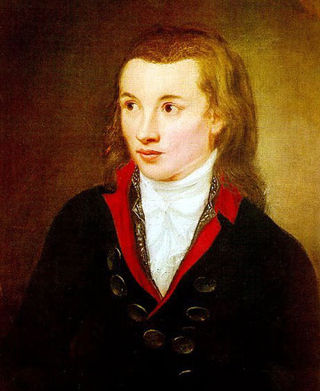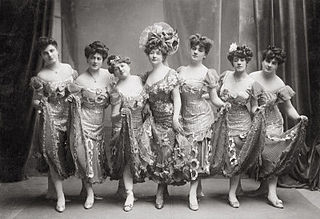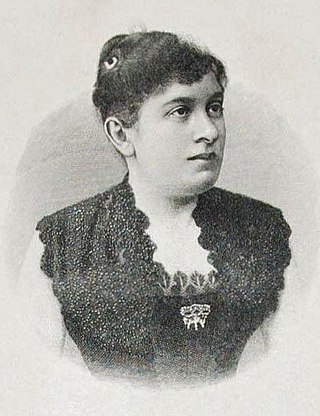
Johann Carl Friedrich Gauss was a German mathematician and physicist who made significant contributions to many fields in mathematics and science. Sometimes referred to as the Princeps mathematicorum and "the greatest mathematician since antiquity", Gauss had an exceptional influence in many fields of mathematics and science; he is ranked among history's most influential mathematicians.

Georg Philipp Friedrich Freiherr von Hardenberg, pen name Novalis, was a German aristocrat and polymath, who was a poet, novelist, philosopher and mystic. He is regarded as an idiosyncratic and influential figure of Jena Romanticism.

Carl Dahlhaus was a German musicologist who was among the leading postwar musicologists of the mid to late 20th-century. A prolific scholar, he had broad interests though his research focused on 19th- and 20th-century classical music, both areas in which he made significant advancements. However, he remains best known in the English-speaking world for his writings on Wagner. Dahlhaus wrote on many other composers, including Josquin, Gesualdo, Bach and Schoenberg.

German West Africa (Deutsch-Westafrika) was an informal designation for the areas in West Africa that were part of the German Colonial Empire between 1884 and 1919. The term was normally used for the territories of Cameroon and Togo. German West Africa was not an administrative unit. However, in trade and in the vernacular the term was sometimes in use.

Astronomische Nachrichten, one of the first international journals in the field of astronomy, was established in 1821 by the German astronomer Heinrich Christian Schumacher. It claims to be the oldest astronomical journal in the world that is still being published. The publication today specializes in articles on solar physics, extragalactic astronomy, cosmology, geophysics, and instrumentation for these fields. All articles are subject to peer review.
The notion of postdramatic theatre was established by German theatre researcher Hans-Thies Lehmann in his book Postdramatic Theatre, summarising a number of tendencies and stylistic traits occurring in avant-garde theatre since the end of the 1960s. The theatre which Lehmann calls postdramatic is not primarily focused on the drama in itself, but evolves a performative aesthetic in which the text of the performance is put in a special relation to the material situation of the performance and the stage. The postdramatic theatre attempts to mimic the unassembled and unorganized literature that a playwright sketches in the novel.

Elisabeth Cruciger, a German writer, was the first female poet and hymnwriter of the Protestant Reformation and a friend of Martin Luther.

The Neue Rundschau, formerly Die neue Rundschau, founded in 1890, is a quarterly German literary magazine that appears in the S. Fischer Verlag. With its over 100 years of continuous history, it is one of the oldest cultural publications in Europe.
Theater der Zeit is a German-language monthly magazine that focuses on theatre and politics. It was established in 1946 and is now—alongside Theater heute—one of the leading magazines on theatre in the German-speaking world. In 1996, the Theater der Zeit publishing house began to publish books.

Klaus Zehelein is a German dramaturge. He was president of the Munich Bayerische Theaterakademie August Everding. Zehelein is also president of the association of German theatres, Deutscher Bühnenverein. For fifteen years, from 1991 until 2006, Zehelein was artistic director of the Staatsoper Stuttgart. Critic Gerhard Rohde, summing up Zehelein's theatre work at the Stuttgart opera, says "Zehelein does not view opera as a culinary phenomenon. For him opera is an extremely complex matter, where all arts – as well as social, philosophical, historic, utopic and other aspects – unite. This complexity of opera merits being perceived, being seen, being experienced; thus all works that end up performed on stage, are rigorously analyzed beforehand. He who says this results in thinned-out, merely sophisticated opera performances, missed out substantially in the Zehelein-Era in Stuttgart."
Die Zeit was a German language daily newspaper published in Prague, Czechoslovakia from 1935 to 1938. The newspaper was the central organ of the Sudeten German Party (SdP). The first issue came out on 1 October 1935. Die Zeit took over the role as the central party organ from the weekly Rundschau. Walter Brand was the editor-in-chief of Die Zeit.

Sasha Marianna Salzmann is a German playwright, essayist, theatre curator and novelist. She is writer in residence at the Maxim Gorki Theatre in Berlin where she was artistic director of the studio theatre, Studio Я, from 2013 to 2015.

Ignaz Kirchner was a German actor who made a career on German-speaking stages, especially at Vienna's Burgtheater where he played for 30 years. A character actor, he worked with leading stage directors. He often played opposite Gert Voss, both in classical drama such as Shakespeare's Antonio, with Voss as Shylock, and as Jago, with Voss as Othello, and especially in black comedies, such as Goldberg in Tabori's Die Goldberg-Variationen, and in Neil Simon's The Sunshine Boys, Beckett's Endspiel and Genet's Die Zofen. Kirchner and Voss were named Schauspielerpaar des Jahres twice, in 1992 and 1998.

The Morgenblatt für gebildete Stände was a German cultural and literary journal that existed from 1807 to 1865. It appeared daily until 1851, when it was changed to a weekly journal. The Morgenblatt was published by Cotta in Tübingen and later in Stuttgart, and was the most important German literary and cultural journal of its time.

Theatre photography first took place in the photographer's studio before the photographer could come to the theatre with the appropriate technical equipment and take pictures on stage. Theatre photography is a genre of photography. Its motifs are performers on theatre stages as well as scenery or (rarely) prop or stage design. Trends in theatre photography are drama, opera, ballet, puppet theatre, cabaret, variety show and portraits of artists.
Rosemarie Clausen ; was a German photographer. She worked as theatre and portrait photographer and received several awards for her work.

Ulla Wolff-Frankfurter, also known by the pen names Ulla Frank and Ulrich Frank, was a German Jewish playwright, novelist, and journalist.
Horst Koegler was a German dance critic, journalist and writer. He was the editor and author of books on the ballet scene in Germany, as well as the author of essays in journals and introductions to illustrated books. As a reviewer of German and English-language books, he formed a bridge between American and German dance research.
Neuer Weg was the official media outlet of the East German ruling party, Socialist Unity Party (SED). Its subtitle was organ des Zentralkomitees der SED fur Fragen des Parteilebens. The magazine was in circulation between 1946 and 1989.

Die Gesellschaft was a magazine which was published in German Empire between 1885 and 1902. It billed itself as the "organ of contemporary literary youth". It is known for its strong support for naturalism and its founder and editor Michael Georg Conrad.













